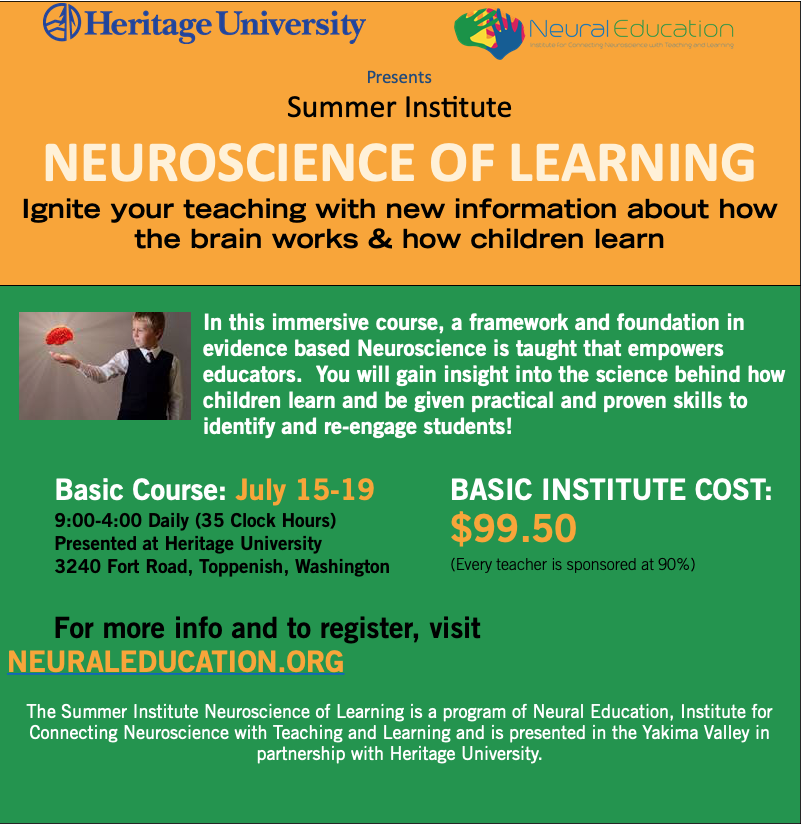Heritage University to host week-long career-enhancing seminar for Yakima Valley teachers
FOR IMMEDIATE RELEASE
Heritage University to host week-long career-enhancing seminar for Yakima Valley teachers
Toppenish, Wash. – Yakima Valley teachers will gain insight into the science of how children learn, and learn how to re-engage their students as part of the Summer Institute Neuroscience of Learningat Heritage University July 15-19. In this immersive course, a framework and foundation in evidence-based Neuroscience is taught that empowers educators. Teachers will gain insight into the science behind how children learn and will be given practical and proven skills to identify and re-engage students.
The Summer Institute Neuroscience of Learning is a program of Neural Education, Institute for Connecting Neuroscience with Teaching and Learning. Its founder, Kieran O’Mahony, Ph.D., FRGS, is a learning sciences fellow with the University of Washington College of Education LIFE (Learning in Informal and Formal Environments) Center. The LIFE Center was the first Science of Learning Center funded by the National Science Foundation whose primary objective was to investigate social, cognitive and neuroscience of how people learn. “Education in America has stagnated, as efforts to raise education levels during the last 50 years have gone nowhere,” said Dr. O’Mahony. “By using a neural lens, we can positively affect our education deficiencies by giving teachers tools and practices that align with how the brain works and how children learn.”
Neural Education aims to enhance education outcomes by inspiring teachers to ignite their classroom using research-based brain science methodologies which allow them to manage the classroom by managing the brain; provide K-12 professional development to help educators realize a new paradigm – a way of thinking about teaching and learning using a neural lens; translate neuro-scientific research (how the brain processes and retains information) into accessible practices and processes; and improve educational outcomes for all students by empowering them to access their own potential as they understand themselves and see themselves as learners. O’Mahony is passionate about how these new methodologies have changed the learning world since the Decade of the Brainin the early years of this century. “It shocked me to realize that for all my years in the classroom, I hadn’t taken any classes on how the human brain works or how children’s brains learn. Today, teachers get to understand the organ that is most influential in learning—the cognitive machinations of each brain—as we create learning spaces that work in their schools.”
“In order to overcome these education deficiencies which may leave anxious and disengaged students behind, we need a new perspective that breaks free of the current system that isn’t working,” said Kari Terjeson, the Chair of the Department of Teacher Education at Heritage University. “Neural educators view teaching and learning as collaborative practices that grow cognitive capacity with the goal of helping every student reach their full potential.”
Heritage University will host the basic summer institute during the week of July 15-19. Participants will learn how to create a stress-free classroom, eliminate disciplinary referrals, increase academic performance and help students self-engage with voice and agency. The Basic Institute cost is normally $995, but with every teacher being sponsored at 90%, the final cost is $99.50, and those who complete the week will earn 35 clock hours.
To register for theSummer Institute Neuroscience of Learning, visit Neuraleducation.org.For more information, contact David Mance at (509) 865-0731 or mance_d@heritage.edu.
# # #

